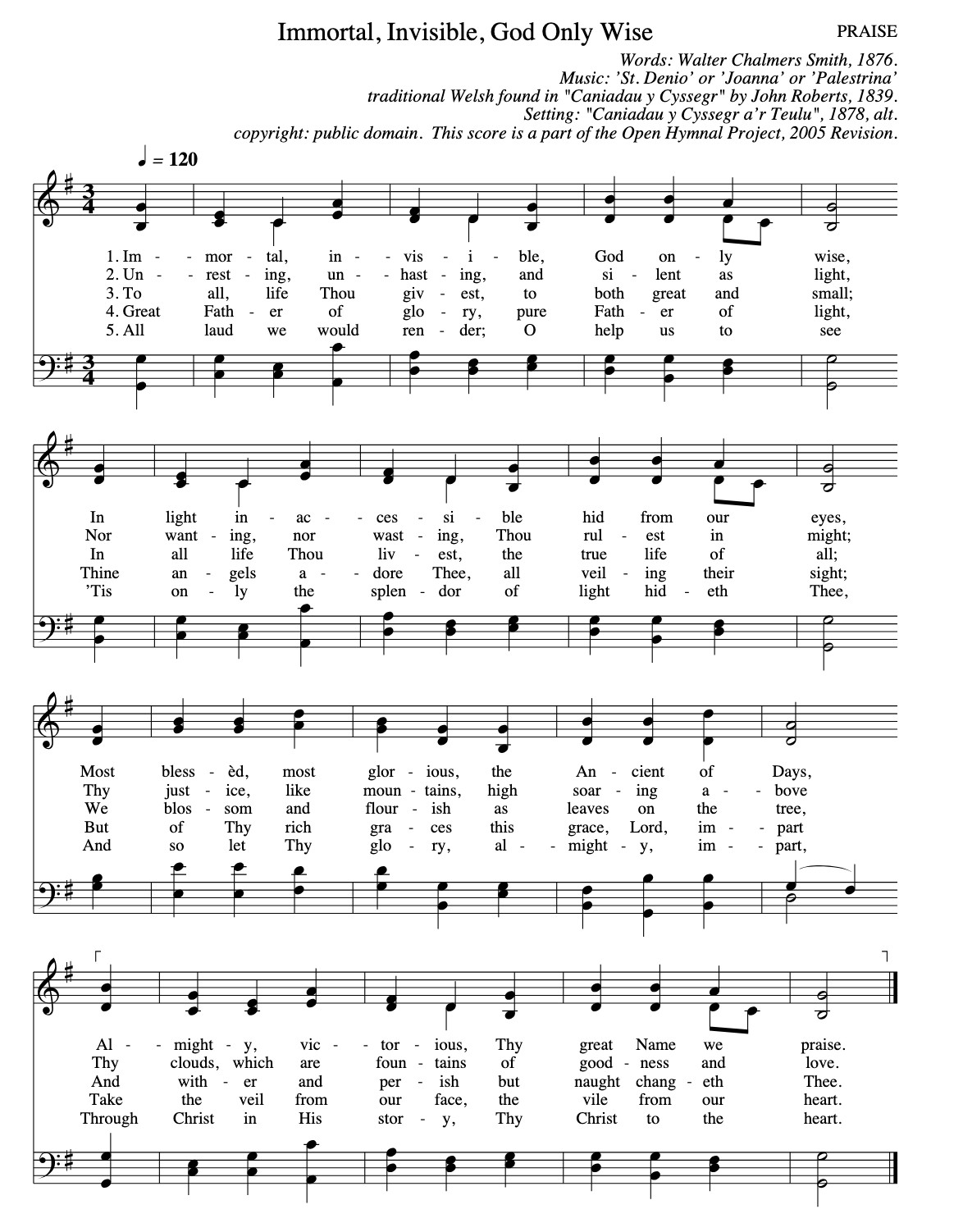
Tracery lights of West Window by John Hardman in St Andrew's, Inverness Cathedral, with the Holy Ghost in the form of a dove at the centre. [Click to enlarge, and for more information].
Immortal, invisible, God only wise,
In light inaccessible hid from our eyes,
Most blesséd, most glorious, the Ancient of Days,
Almighty, victorious, Thy great name we praise.
To all, life Thou givest, to both great and small;
In all life Thou livest, the true life of all;
We blossom and flourish as leaves on the tree,
And wither and perish — but naught changeth Thee.
Great Father of glory, pure Father of light,
Thine angels adore Thee, all veiling their sight;
But of all Thy rich graces this grace, Lord, impart,
Take the veil from our faces, the vile from our heart.
All laud we would render; O help us to see
‘Tis only the splendor of light hideth Thee,
And so let Thy glory, Almighty, impart,
Through Christ in His story, Thy Christ to the heart.

Smith, from a portrait by Sir George Reid, PRSA. Frontispiece to Smith.
Born and educated in Aberdeen before studying theology in Edinburgh, Walter Chalmers Smith (1824-1908) was ordained in Islington in 1850, where he was the minister of the Free Scotch Church in Chadwell Street. Returning to Scotland, he eventually settled in Edinburgh, from 1876 serving as pastor of the Edinburgh Free High Church. He was a well-published poet, producing ten volumes of poetry in the second half of the nineteenth century, with a volume of selected poetry coming out in 1893 (see Horder 505). Such were the themes of his "metrical novelettes" (qtd. in Horder 510) that, despite his interest in Scottish life and social issues, his insights into human nature, his love of nature, and his philosophical inclinations, he is seen primarily as a religious poet.
A pointer to his inspiration here is given at the foot of the hymn in Hymns Ancient & Modern, with the bible reference to the First Epistle of Paul the Apostle to Timothy, "Now unto the King eternal, immortal, invisible, the only wise God, be honour and glory forever and Amen" (I: 17). In acknowledging the unknowability of the presiding spirit and the contrasting transience of our individual human lives, the words have an appeal to those of any denomination and even none. This is especially so now, because the hymn is generally sung in a shortened form, with just four verses, leaving out the last two lines of each of the last stanzas. References to Christ are thus omitted in a condensed last verse:
Great Father of glory, pure Father of light,
Thine angels adore Thee, all veiling their sight;
All laud we would render; O help us to see
‘Tis only the splendor of light hideth Thee.
The Revd Smith might not have approved of this version, but it does have more universal appeal.
Yet the hymn might never have become as universally popular as it is, without its melody. Unlike many other hymns, it is only ever sung to one tune, its "sturdy Scottish words" resounding in a "strong Welsh melody" adapted from a then popular ballad ("Can mlynedd y nawr" or "A hundred years from now") by a striking figure — musician, poet, teacher, speaker and preacher, a true Welsh bard, John Roberts (1822-1877).


Left: John Roberts (Ieuan Gwyllt) (1822–1877), in a portrait by Evan Williams (1816–1878). Public domain, via Art UK. Image credit: Llyfrgell Genedlaethol Cymru / The National Library of Wales. Right: Opening bars of the hymn score from openhymnal.org, also public domain.
Alan Luff explains that the tune, known as "St Denio" outside Wales, "begins as if in a different key and only reaches the notes of the home key at the end of the first line. This thrusts into prominence the fifth note of the tune which signals that the first expectation was wrong" (154). There is, then, an element of surprise that catches the singer and makes the tune (and words) particularly memorable. So here is an instance where "sturdy Scottish words" are matched with "a strong Welsh melody" (Morgan 250) to provide churches all over the world with one of their most powerful and best-loved hymns.
Links to Related Material
Bibliography
Horder, W. Garrett. "Walter Chalmers Smith." The Poets and the Poetry of the Century. Vol. X: Sacred Moral, and Religious Verse. Ed. Alfred H. Miles. London: Hutchinson, 1898. 505-10. Google Books. Free ebook.
Hymns Ancient & Modern, New Standard. Full Music Edition with Hymn Guide to the Three Year Lectionary, CLC 2000 (this is hymn no. 199).
Luff, Alan. Welsh Hymns and Their Tunes: Their Background and Place in Welsh History and Culture. London: Stainer & Bell, 1990.
"Immortal, invisibe, God only wise." The Canterbury Dictionary of Hymnology. Canterbury Press. Web. 9 August 2025.
Morgan, Robert J. Near to the Heart of God: Meditations on 366 Best-Loved Hymns. Grand Rapids, Michigan: Revell, 2010.
Smith, Walter Chalmers. Poetical Works. London: Dent, 1902. Internet Archive, from a copy in Robarts library, University of Toronto. Web. 10 August 2025.
Created 10 August 2025